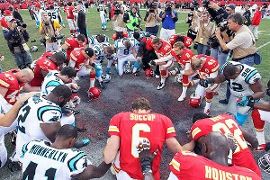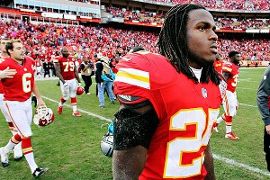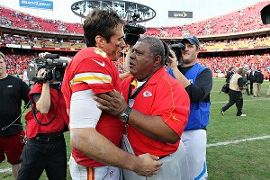|
KANSAS CITY, Mo. -- It didn't matter what the Arrowhead Stadium scoreboard showed on Sunday afternoon. It only mattered that the Kansas City Chiefs were bonded, focused and helping each other cope with an unimaginable tragedy. The debate about whether they should play the Carolina Panthers just one day after linebacker Jovan Belcher killed his girlfriend and himself had raged before that point. Now we know why the Chiefs chose to keep their schedule intact: They needed to be together.  As encouraging as Kansas City's 27-21 victory had to be -- especially for a team that is now just 2-10 -- this game reinforced how some pro football players need to heal. They have to compete. They have to compartmentalize their feelings and attack a common goal. Sure, it might make little sense to the people who condemned the very idea of this game being played. But if you heard the Chiefs talk afterward, it would've been difficult to see how they could've postponed this contest.
As encouraging as Kansas City's 27-21 victory had to be -- especially for a team that is now just 2-10 -- this game reinforced how some pro football players need to heal. They have to compete. They have to compartmentalize their feelings and attack a common goal. Sure, it might make little sense to the people who condemned the very idea of this game being played. But if you heard the Chiefs talk afterward, it would've been difficult to see how they could've postponed this contest.
Head coach Romeo Crennel said Sunday's game was the best thing for his team because "we're football players and coaches. That's what we do on Sundays." Chiefs center Ryan Lilja, one of the team captains who made the decision, was more poignant in describing his own feelings on the matter. "None of the options were good," Lilja said. "The least worst option was to play. There was no precedent for this, and I don't know if it was the right or wrong choice. But we chose to do it together." It wasn't hard to feel the emotion in Lilja's trembling voice or the pain in people throughout the franchise. This was the first time the Chiefs had spoken publicly since they heard about Belcher murdering his 22-year-old girlfriend, Kasandra Perkins, and later shooting himself in the parking lot of the team's facility Saturday morning. Crennel, general manager Scott Pioli and defensive coordinator Gary Gibbs witnessed Belcher take his own life.  Many argued that the rawness of those events called for the Chiefs to put their shoulder pads away for one Sunday. The reality was that they weren't ready to find another way to deal with the grieving process. The same culture that led Belcher to hide whatever demons he was facing has affected so many professional football players. Sharing weakness doesn't come easily. Actions, too often, work far better than words.
Many argued that the rawness of those events called for the Chiefs to put their shoulder pads away for one Sunday. The reality was that they weren't ready to find another way to deal with the grieving process. The same culture that led Belcher to hide whatever demons he was facing has affected so many professional football players. Sharing weakness doesn't come easily. Actions, too often, work far better than words.
That doesn't mean the Chiefs came to work looking for an easy escape from their pain. They came because most knew they couldn't process this tragedy in their own personal sanctuaries. Linebacker Derrick Johnson said Belcher's death didn't really hit him until he woke up Sunday morning and drove to the stadium. Lilja talked about a desire to hug every teammate when he walked into the locker room. Quarterback Brady Quinn went even deeper: He pondered how well people actually communicate their real feelings in a society where social media dominates. Even the mood among Chiefs players afterward could best be described as uncertain. The Chiefs trudged into the locker room looking like a squad that had just finished a long day of heavy construction: few smiles, blank stares, the joy of victory impossible to see. "There was no elation," Crennel said. "They were happy they could just get through the game."  Aside from being together, there were other positives that came from Sunday. We talk about leadership constantly in pro sports, but Crennel -- whose lack of success likely will lead to him being fired after his first full season as Kansas City's head coach -- embodied it by steadying a team just hours after watching Belcher end his life. The same comical squad that led the NFL in turnovers also played a nearly flawless game. It gave up only one sack, didn't commit a turnover and took just one penalty (an intentional delay of game).
Aside from being together, there were other positives that came from Sunday. We talk about leadership constantly in pro sports, but Crennel -- whose lack of success likely will lead to him being fired after his first full season as Kansas City's head coach -- embodied it by steadying a team just hours after watching Belcher end his life. The same comical squad that led the NFL in turnovers also played a nearly flawless game. It gave up only one sack, didn't commit a turnover and took just one penalty (an intentional delay of game).
Most importantly, the Chiefs reminded us that sports are about family as much as fundamentals. Players openly talked about ways to support the 3-month-old child of Belcher and Perkins, a baby girl named Zoey who's now facing an uncertain future unimaginable to most of us. Team owner Clark Hunt emphasized that therapists will be available to all who need support. Crennel also talked about how critical it was for his team to be together when he addressed them on Saturday morning. "The thing that helped the most was that we were able to lean on each other," Crennel said. "We were able to let some things out." The Chiefs also had to walk the fine line between missing a friend and adoring a murderer. There was no mention of Belcher or Perkins during a moment of silence before the game -- the message was meant to show support for victims of domestic violence -- but a team employee had left Belcher's jersey, shoulder pads, helmets and cleats in his locker. "The hardest part is to try and speak positively about [Belcher] and also know what happened," said right tackle Eric Winston. "That's the most confusing part for me. I've dealt with somebody taking their own life before, but never something like this."  That's the most vital part of this story to remember.
That's the most vital part of this story to remember.
Nobody on this team had ever gone through such a traumatic moment, and each of them has been drowning in emotions ever since Saturday morning came and went. Players made tough choices that were scrutinized and then played with heavy hearts. They weren't prepared for any of this. For all the toughness of the sport, life still delivers much harsher blows on a regular basis. But say this much for the Kansas City Chiefs -- they represented themselves well in the midst of perhaps the ugliest season in franchise history. They've been booed at home, lambasted by nearly everybody who's watched them play and regularly served up as a punch line. On Sunday, all that stuff seemed to mean nothing in a town where pro football reigns supreme and two families are forever damaged. The only image of the Chiefs on this day was one of a team fighting to heal itself in the only way it really knew how.
|

